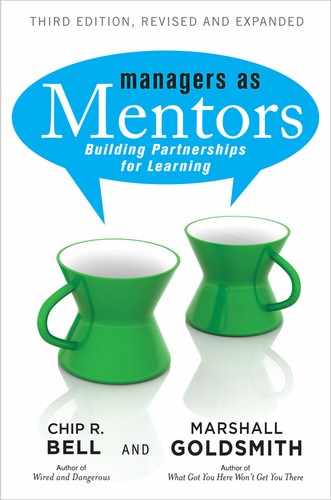Beginning Our Journey
What is mentoring? At its most basic level, it is simply the act of helping another learn. However, the relationship between helper and helpee changes significantly when performed as a learning partnership rather than the traditional teaching “parentship” (master teaches apprentice).
The concept of mentoring as a learning partnership is one rather foreign to many. They rely on the stereotypical approach, using their expertise to teach rather than facilitate; demonstrate instead of enabling discovery. Lecturing to their protégés, they leave them temporarily capable but unwise in the long run. What comes from a capability-adding approach is only compliance; however, what emanates from a wisdom-building approach is creativity—the foundation of innovation. Competitive organizations today need “learning entrepreneurs.” Today, curiosity almost always trumps conformity.
Words like “mentor” and “coach” are sometimes used to mean the same thing. Here is our distinction: Coaching is a part of the leadership role specifically aimed at nurturing and sustaining performance. Mentoring is that part of the leadership role that has learning (competence, proficiency, skill, know-how, wisdom) as its primary outcome. Granted, learning impacts performance, and that in turn impacts the accomplishment of important goals. You will encounter this definition more than once.
The words we use for the players in the mentoring partnership are chosen more for convenience than for any other reason. “Mentors” are people (especially leaders) who engage in deliberate actions aimed at promoting learning; “leader,” “manager,” or “coach” would serve as well. Mentors do not have to be in a superior power position. One might easily be mentored by someone who possesses the needed skill or competence but is several levels below in the pecking order.
Some organizations find the label “mentor” to have special negative baggage, often the result of ill-fated mentoring programs. “Learning coach” is often a solid substitute. Likewise, “protégé” refers to the primary beneficiary of the mentoring effort; “associate,” “subordinate,” “colleague,” “mentee,” “partner,” or “follower” could be used. As long as we are clear on whom we mean, the labels can be changed to fit individual preferences and situations.
The main thing to remember is that this book is grounded in a partnership philosophy. It has no secrets aimed at making you look good to an unknowing subordinate, and we hope you will share it with your colleagues and associates and protégés. The more you know about how to mentor, the better the mentoring relationship will work for you. The same is true for the protégé. Some have found discussing the book helpful in improving the process of mentoring. Do what works for you.
